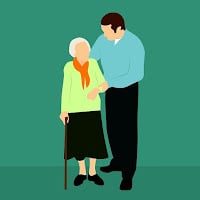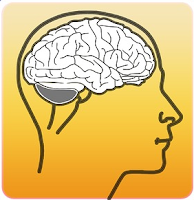Alzheimer’s can cause a lot of symptoms regarding cognitive function and can impair memory, learning, and communication. However, there are also many emotional and mental symptoms associated with Alzheimer’s disease as well. This can be hard on the individual and their family and make cognitive symptoms worse by impeding mood.
While there is no cure for Alzheimer’s disease, there are some things that can help you or your loved one cope. The entire situation can be tough and hard to navigate but knowing the emotional and psychological toll the disease can have can be beneficial because it helps you identify the cause and potentially find a better way to manage the symptoms.
Before examining the coping methods, it is a good idea to learn how Alzheimer’s can impact mental health.
Depression

Depression is very common in people who have Alzheimer’s disease. The rate of depression in those who suffer from Alzheimer’s is significantly higher than it is for the general population. The causes of this may be related to both the changes in the brain as well as the impact that an Alzheimer’s diagnosis can have on outlook and mood.
The symptoms of depression in those who have Alzheimer’s can be similar to depression in anyone else. Common symptoms include apathy, guilt, shame, changes in sleeping habits, and grief. The individual may be saddened by the fact that their future is not going to be the same as they had anticipated, and they may even struggle to tell their family or find motivation to get out of the house.
Anxiety
Anxiety is another common mental health issue in those who are diagnosed with Alzheimer’s disease. Anxiety can be characterized by excessive worry or fear as well as fidgeting behaviors, aggression and irritability, and doubt about the future or the current situation. Someone with Alzheimer’s may have anxiety about treatments, timelines, and life in general.
Anxiety can also cause someone with Alzheimer’s to feel isolated or alone. It can spark fear about remembering the people in their life and whether they will not be able to live at home. It is often a fear about conflicting sides where the individual does not want to know the future but knows that it will be impacted by the diagnosis.
Changes in Sleep
People with Alzheimer’s may not be able to relax the mind enough to fall and stay asleep and drastic changes in sleep patterns may even be an early sign of Alzheimer’s. In addition, lack of sleep can also cause difficulty with cognitive function and could worsen the development of Alzheimer’s.
Finding an effective treatment option to improve sleep may help to slow the progression of the disease. Lack of sleep can also make anxiety worse and cause other mental and emotional health problems.
Shock and Denial
Being diagnosed with Alzheimer’s is bound to affect emotional health and may place the individual in a state of shock. It can be hard to process the events that are occurring, and it may be hard to think logically about the situation.
Some people with Alzheimer’s disease may even go into a period of disbelief and denial. They may feel like the diagnosis is incorrect or that they were just having an off day during the tests. They may even convince themselves that their memory problems are just a sign of old age and not indicative of Alzheimer’s.
How to Cope
There are a lot of strategies for coping with a diagnosis and symptoms of Alzheimer’s disease. It can be difficult to move forward and learn how to manage immediately following the diagnosis, but it is possible to slow the progression and improve quality of life at the moment.
First, regular health advice can go a long way to helping to improve mood and health. Getting regular exercise, sufficient sleep, and eating nutritious foods can all improve symptoms. You can also use stress management techniques to boost positivity, reduce stress, and relieve tension.
Having a support system is also important. People with Alzheimer’s may try to isolate themselves but being around loved ones can be very good for coping with a variety of symptoms. Having a support system to share your concerns and changes can be enlightening. You can also talk with your doctor or visit with a mental health professional about your emotional and psychological symptoms.
Some Alzheimer’s patients find that writing their thoughts down in a journal can help them process the information and organize their anxieties. You can write anything you want, and it remains private. This can help you find erroneous thinking processes as well as places where your own thoughts may be causing distress.
It can also help to compile information about Alzheimer’s disease and find advice from others who have been through similar situations. This can also help to relieve some anxiety because reading about the progression of the disease can help you know what to expect. You can find a lot of great articles and resources about Alzheimer’s at BetterHelp. This type of information can help you prepare and find support for you and your loved ones.
Conclusion
Alzheimer’s can be a debilitating disease and can cause issues with cognition, mental health, and personality. Many people suffering from Alzheimer’s disease also struggles with depression, anxiety, and other emotional issues. These are things to consider when identifying the best coping methods that can you and your loved ones slow the progression of the disease and manage current symptoms.

Photo Credit: iStock
The post Alzheimer’s Disease appeared first on The Good Men Project.
Original Article










